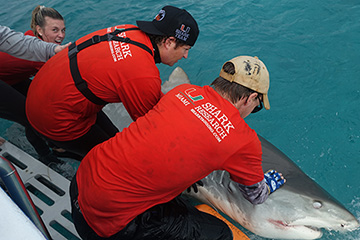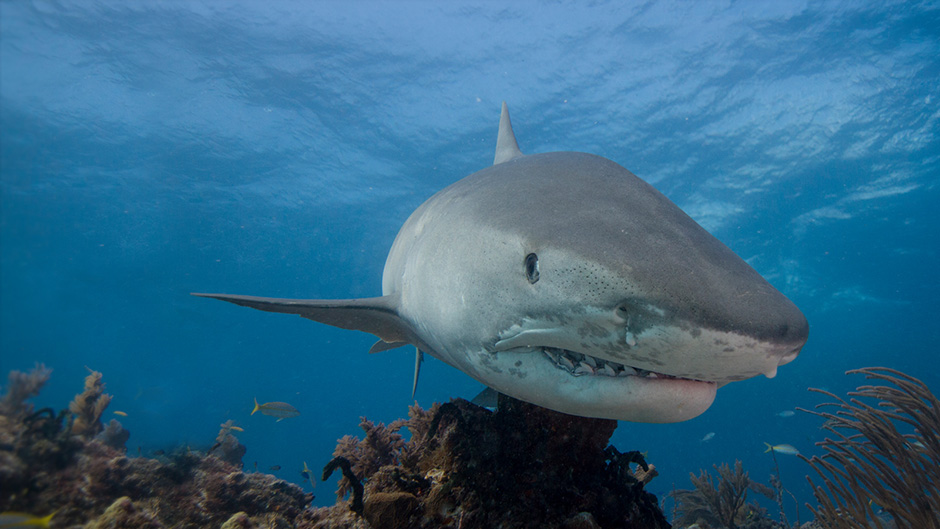This year’s Discovery Channel Shark Week kicks off with science from University of Miami’s Rosenstiel School of Marine and Atmospheric Science shark researcher Neil Hammerschlag and collaborators in the Bahamas. The show, called “Tiger Beach,” will follow Hammerschlag and colleagues as they study tiger sharks to better understand the life of these massive predators. The show airs at 8 p.m. on Sunday, June 26.
“I am proud to be involved in a show that focuses on the science and conservation of these magnificent predators,” said Hammerschlag, a research assistant professor at the Rosenstiel School and UM Abess Center for Ecosystem Science and Policy. “Many shark populations throughout the world are in decline primarily from overfishing. Understanding the behaviors of these animals is needed to implement effective protection.”
 Since 2010, Hammerschlag and colleagues have been studying the movements and behaviors of tiger sharks at Tiger Beach, a site in the Bahamas known for its year-round abundance of tiger sharks. With help from research collaborator James Sulikowski from the University of New England, Hammerschlag sets out to answer what he calls the trifecta of tiger shark science: where do these giant sharks mate, where do the pregnant females gestate, and where do they give birth? He hopes to find answers by tagging and tracking 40 individuals across Tiger Beach.
Since 2010, Hammerschlag and colleagues have been studying the movements and behaviors of tiger sharks at Tiger Beach, a site in the Bahamas known for its year-round abundance of tiger sharks. With help from research collaborator James Sulikowski from the University of New England, Hammerschlag sets out to answer what he calls the trifecta of tiger shark science: where do these giant sharks mate, where do the pregnant females gestate, and where do they give birth? He hopes to find answers by tagging and tracking 40 individuals across Tiger Beach.
In the show, Hammerschlag and Sulikowski use the same ultrasound imaging technology used by medical professionals on humans in order to determine the reproductive status of female tiger sharks at Tiger Beach. Determining the reproductive strategies and mating behaviors of animals is important for the conservation and management of the species.
“We are extremely proud of Neil’s marine conservation program and his work with sharks,” said Dean Roni Avissar, “Marine conservation science is essential to expanding our knowledge about threatened animals like sharks and providing policy makers and resource managers with sound science for marine conservation policy.”
Hammerschlag will also lend his shark expertise to “Air Jaws: Night Stalker” airing Tuesday, June 28 at 10 p.m. Together with famed shark photographer Chris Fallows and shark expert Jeff Kurr, the team explores great white sharks hunting seals under the total darkness of night. Hammerschlag has been studying the hunting behavior of great white sharks with Fallows in South Africa since 2002.
Discovery Channel’s Shark Week, which premiered in 1988, is the longest-running cable TV programming event in history. It reaches 72 countries and is heavily promoted via social networks like Facebook and Twitter. Last year, the series had an average of 2.5 million viewers in primetime.
The UM Shark Research and Conservation Program is a joint program of the Rosenstiel School of Marine & Atmospheric Science and the Leonard and Jayne Abess Center for Ecosystem Science and Policy. The Abess Center encourages innovative interdisciplinary initiatives that bridge the gap between hard science and environmental policy. For more information, please visit: https://SharkTagging.com.
Additional information:
-
Join a shark tagging trip and gets hands on research experience with sharks: http://sharkresearch.rsmas.miami.edu/participate/citizen-science-public-expeditions
-
Adopt a Shark: http://sharkresearch.rsmas.miami.edu/donate/adopt-a-shark
-
Donate to support our shark conservation research: http://sharkresearch.rsmas.miami.edu/donate/online
Follow us on social media:
UM Shark Research & Conservation Program:
-
twitter: @UMSharkResearch
-
Instagram: @Sharktagging
-
facebook: www.facebook.com/sharktagging
-
Website: www.SharkTagging.com
Neil Hammerschlagg:
-
twitter: @DrNeilHammer
-
Instagram: @DrNeilHammer

